Mapping the crisis of imperialism: the unsaveable Europe
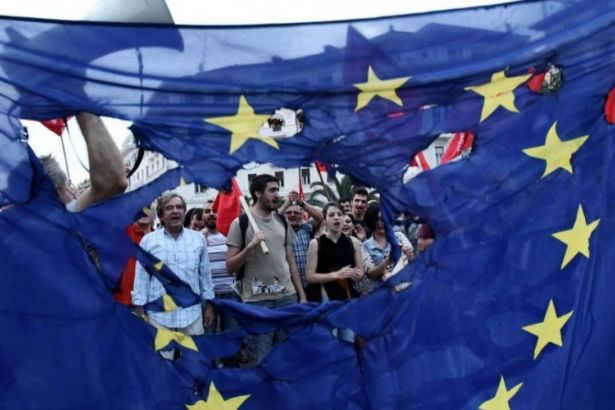
Because of the long-term, 10-year economic depression of the world capitalist system, the diversified blockage within the imperialist system revealed itself in the USA and of course in the union of Europe and the Old Continent.
The opposite was not possible. Because while the factor tidying up the anti-communist holy alliance following the World War II was the US, the frontline against socialism was the European Union in every sense. Contrary to popular belief, the great war against socialism took place in Europe. Socialism retreated and was defeated in Europe. Therefore, The EU was one of the partners of the project to ‘bulldoze’ the world and make the proper arrangements for the new post-Soviet period under the leadership of the US.
However, feeling the crisis strongly as well as reaping the fruits of the ‘triumph’ must be by nature.
THE CRISIS RESIDUE ECONOMY
According to the data of the World Bank, the biggest economy of the world is still clearly the US ($18 trillion). Putting aside the Japan, the third biggest ‘stable’ economy in the Far East, and the second biggest economy People’s Republic of China, there are four EU countries among the remainder of the ‘top 10’: Germany being the fourth ($3.3 trillion), the UK being the fifth ($2.9 trillion), France being the sixth ($2.4 trillion), and Italy being the eighth ($2.9 trillion) biggest.
Germany holds the complete control at least across the Continent, even if not ‘well ahead’ of the whole Europe. It may broaden our horizon to compare Germany and France at this point. Considering the fact that both countries have export-led economies, the statistics below (Germany and France respectively) may explain the tragic state France is in against Germany:
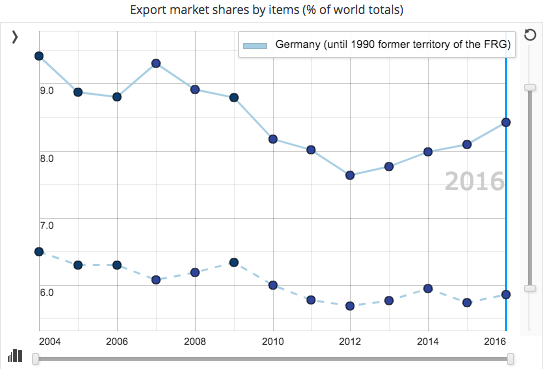
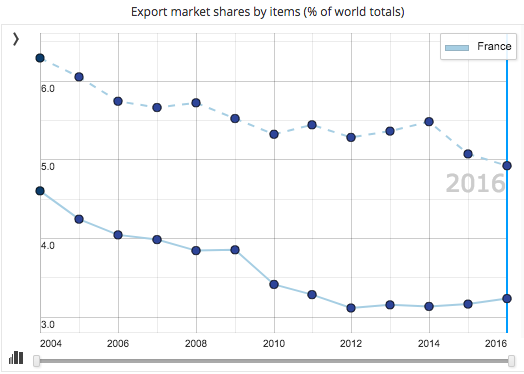
These charts show the change in the shares of the two countries within the whole export market in the world. France’s export share gradually decreases every year.
Being not able to stop the rise in the prices, France has become more and more dependent on the ‘structural reform’, while Germany needs easier access to foreign markets to sustain its low-cost and export-based economy. The forced ‘reforms’ in France to lower the labour costs clearly targets to facilitate the competition with Germany as well.
However, Germany’s economic superiority over France is not the only one. German creditors’ shoving down the Greek’s throat was just the prelude. Even though every European country has an external debt of billions of US dollars and continuously becomes indebted to each other, Italy, Spain, and Portugal are among the ‘fragile’ countries which German creditors will come down on.
For the very economical reason, it is not surprising that Germany is the world champion of austerity and neo-liberal export economy policy. It is better to repeat it here: German monopolies need ‘open’ markets to sustain their exports. It is comprehensible at this point why the only big imperialist country is Germany which is tightly attached to the ‘established order’ and seen as a block (not actually, but this is another issue).
THE TROUBLE BREXIT CAUSED
Another issue not mentioned above deliberately is the troubles caused and will be caused by the UK’s exit from the EU (‘Brexit’).
The German authorities’ like the Secretary of State Sigmar Gabriel’s rash criticism towards Theresa May on the British media is directly related to Germany’s above-mentioned economic position.
Then can we tell the same for the UK?
The data shows: Although the EU countries still have a big share in the UK’s total trade, this rate is on the decline for the last 15 years. The Kingdom had its export of 240 billion Euros (44 percent) out of 550 billion Euros to the EU countries in 2016, however, this rate was continuously decreasing and the trade volume with non-EU countries was growing till 2013.
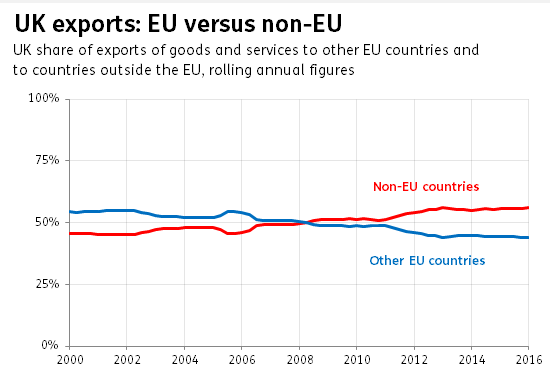
(UK exports: EU, non-EU countries, Source: Fullfact.org)
The statistics also show that the UK’s export to EU was 230 billion Euros in 2015 while the EU countries export to the UK was 290 billion Euros.
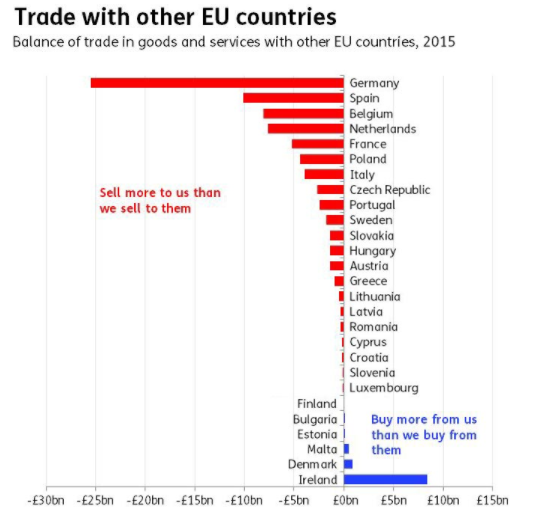
(Resource: Office for National Statistics)
The last table also explains Germany’s reaction regarding Brexit and the political atmosphere it created. Germany’s export to the UK within the EU is very high. During the third quarter of 2016, there were reviews that the sharp drop in the German export to the UK and the US is related to Brexit and the American presidential elections. The USA is the first largest export market of Germany and the UK is the third largest one.
For some of the British monopolies, new trade agreements with the EU and the US outside the Union is more profitable and it is also a move that could change the trade balance.
RUSSIA’S ‘DESTRUCTIVE’ IMPACT
Russia and its leader Putin stop at nothing to break or reduce the ‘Atlantic effect’ in Europe, to be honest.
It is known that Russia has started to establish relations beyond the ‘ties of affection’ with the right-populist and proto-fascist parties/movements in Europe. Among the participants of the ‘International Russian Conservative Forum’, which can also be called as ‘Fascist International’ gathered in 2015, there was also the Golden Dawn as well as many neo-fascist parties. Besides, it had been previously revealed that Aleksandr Dugin, one of the leading figures of ‘Eurasianism’ corresponded with Mihalolyakos, leader of the Golden Dawn.
Furthermore, Marine Le Pen had accepted his party FN’s getting a loan from the Russian-financed First Czech-Russian Bank in 2014. But Le Pen alleged that this credit did ‘not have any influence on their policies’.
It is also discussed that FN was not the only one getting the loan from the Russian bank. Among the other European parties, there are also Vlaams Belang from Belgium, North League from Italy, Jobbik from Hungary, and Freedom Party from Austria.
This is the ‘financial’ part of it. However, it is not possible to claim that it had no influence. Russia makes use of the division in Europe to create its own columns by taking advantage of the crisis in the world capitalist system. One wing of the capital desires at least a détente with Russia; not a fight with Russia, but a cooperation or only a ‘discreet competition’ with it.
POLITICAL DIMENSION OF THE CRISIS IS MORE COMPLEX
It is important to remember one point while considering the political dimension of the crisis: The ‘off-system’, ‘against the established order’ and mostly right-populist movements do not constitute the crisis of a fraction within the divided imperialist system but the general crisis of capitalism.
It is critical not to miss out this point so as to understand the developments in the European politics. Because we do not have any data that the ‘financialisation’ and internationalisation of the capitalism can be overcome through an autarchic model. The current condition of the capital accumulation regime should be taken into account while evaluating the political division caused by the crisis of capitalism.
For the very reason, it is more realistic to consider the split in Europe, real in one way and artificial in another, as tendencies possible to approach each other rather than political trends drifting apart. Let’s clarify our point:
Our example is France. The results of the first cycle of the presidential elections in France are the indicator of the collapse of the ‘established order’ for many commentators. The established order means the ongoing political system like a ping-pong game between the conservatives and the ‘socialists’. The competition between Macron, the representative of a political movement that is not even a ‘party’, and sort of proto-fascist Marine Le Pen may be the indicator of the disintegration of the ‘political centre’ in France.
But the disintegration of the political centre does not mean that a new centre cannot be established. The biggest indicator of it is Le Pen’s recent attempts to approach the old ‘centre’. For instance, while announcing that he left the party leadership to be more ‘inclusive’, Le Pen also gives the signs of a more ‘balanced’ position in the foreign policy. This can be called as ‘pro-independence’.
But it is not only about Le Pen and France. Interesting enough, Norbert Hofer, presidential candidate of the right-wing Freedom Party in the last year’s elections, announced their commitment to the EU saying that ‘we need a real and complementary union’. And Heinz-Christian Strache, leader of the same party, stated that they want to protect Euro but they do not want the EU to be ‘a centralised European federal state’.
However, this issue can be addressed from the other way round: Mehdi Hasan for the Intercept considered the centre-right and centre-left policies responsible for the rise of the right-populist movements and pointed out that these policies actually normalised the xenophobic and Le Pen-esque policies by using them for decades.
This does not mean that the old ‘centre’ and the new ‘rebels’ will split the difference. On the other hand, the political restoration in Europe is tried to be realised through the ‘friction and flirts’ among the cadre, where Trump-May-Le Pen trio (maybe Putin as well!) form one front, while Merkel-Schulz (maybe Şi Cinping, too!) and the EU institutions form the other.
Considering that the US and Russia continue their ‘destructive’ activities by taking the advantage of this opportunity, the reflections of the current crisis of capitalism on Europe do not seem to settle down the waters. The ‘uprising’ within the Union towards Germany does not contribute to the labour class, as seen in the example of France.
Tomorrow: The placated war in the South China Sea
MAPPING THE CRISIS OF IMPERIALISM - I :




